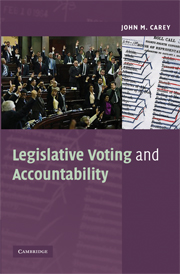Book contents
- Frontmatter
- Contents
- Preface
- 1 TO WHOM ARE LEGISLATORS ACCOUNTABLE?
- 2 COLLECTIVE ACCOUNTABILITY AND ITS DISCONTENTS
- 3 THE SUPPLY OF VISIBLE VOTES
- 4 DEMAND FOR VISIBLE VOTES
- 5 COUNTING VOTES
- 6 EXPLAINING VOTING UNITY
- 7 THE INDIVIDUAL-COLLECTIVE BALANCE
- Appendix: Interview Subjects by Country
- References
- Index
- Titles in the series
2 - COLLECTIVE ACCOUNTABILITY AND ITS DISCONTENTS
Published online by Cambridge University Press: 05 June 2012
- Frontmatter
- Contents
- Preface
- 1 TO WHOM ARE LEGISLATORS ACCOUNTABLE?
- 2 COLLECTIVE ACCOUNTABILITY AND ITS DISCONTENTS
- 3 THE SUPPLY OF VISIBLE VOTES
- 4 DEMAND FOR VISIBLE VOTES
- 5 COUNTING VOTES
- 6 EXPLAINING VOTING UNITY
- 7 THE INDIVIDUAL-COLLECTIVE BALANCE
- Appendix: Interview Subjects by Country
- References
- Index
- Titles in the series
Summary
The Strong-Party Ideal
The normative desirability of strong-party government is often taken as axiomatic among academics. In 1950 the American Political Science Association published a widely read report urging reforms to strengthen the two major U.S. parties in the name of enhancing collective accountability, or what the APSA called “responsible party government.” In doing so, the APSA was itself hearkening back to a vision of party-led parliamentary government espoused almost a century earlier by the British journalist and scholar Walter Bagehot (1867). As the APSA (1950:1) put it, “An effective party system requires, first, that the parties are able to bring forth programs to which they commit themselves and, second, that the parties possess sufficient internal cohesion to carry out these programs.”
The report, moreover, explicitly linked the party unity that makes possible collective accountability to the ability of the national party organizations to cultivate control over the sort of electoral resources that would make them stronger principals to congressional candidates:
As for party cohesion in Congress, the parties have done little to build up the kind of unity within the congressional party that is now so widely desired. Traditionally congressional candidates are treated as if they were the orphans of the political system, with no truly adequate party mechanism available for the conduct of their campaigns. Enjoying remarkably little national or local party support, congressional candidates have mostly been left to cope with the political hazards of their occupation on their own account. A basis for party cohesion in Congress will be established as soon as the parties interest themselves sufficiently in their congressional candidate to set up strong and active campaign organizations in the constituencies. […]
- Type
- Chapter
- Information
- Legislative Voting and Accountability , pp. 23 - 42Publisher: Cambridge University PressPrint publication year: 2008



